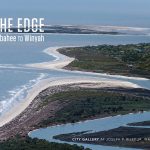WOKE: Rattling Bones, Conversations, Sacred Rites and Holy Places

WOKE: Rattling Bones, Conversations, Sacred Rites and Holy Places
The City of Charleston Office of Cultural Affairs presents WOKE: Rattling Bones, Conversations, Sacred Rites and Holy Places at City Gallery April 3 through May 6, 2018, curated by Dr. Dr. Ade Ofunniyin, Executive Director of the Gullah Society and Project Director of the Gullah Society Sacred Burial Ground Project. A preview reception will be held at the City Gallery on March 28 from 5pm-7pm. A Backpack Journalist, a local organization focusing on student journalism, has collaborated on the exhibition, facilitating the loan of an extensive set of photographs by Civil-rights era photographer Leonard Freed (1929-2006). Multiple community conversations and workshops are planned through the run of the exhibition. All events are open to the public and free to attend.
Using the unearthing of remains of 36 African-descended individuals during the 2013 renovation of the Gaillard Center as a point of departure, the exhibition will serve as a learning laboratory to share information and documentation about newly recognized and at-risk cultural heritage sites. The intention of the exhibition is to allow the public to participate in the process of honoring ancestral generations and to stimulate awareness to promote understanding and stewardship of Charleston’s past.
Visitors to the exhibition will learn about the “Anson Street Burials Project,” including the archaeological, historical and scientific research associated with the site. The exhibition will frame the questions, Who were these people? How did they come to be buried here? — and most importantly — What are their stories? These individuals—buried in the mid-late 1700s—are among the earliest-known burials in Charleston, and the unearthing of their remains provides and points to the opportunity to more fully investigate and document past and present African descendant identity in the Charleston area, through family history, DNA, and genealogical research.
“We are excited about this significant opportunity to reconcile the past, and honor the people buried on this sacred ground,” says Gullah Society founder, Dr. Ade Ofunniyin. “We hope that future DNA research, in combination with long since completed archaeological research, will help us learn more about the individuals buried at this site.”
The exhibition will further explore cultural legacies by documenting research and field work currently underway at other locations throughout Charleston and the Lowcountry. This will include documentary photographs by renowned photographer Leonard Freed taken during the Civil Rights era that capture burial and religious practices on Johns Island, and other iconic images of South Carolina and the Southeastern United States.
About the Exhibition Partners
To learn more about the Gullah Society, visit here.
To learn more about A Backpack Journalist, visit here.
To learn more about photographer Leonard Freed, visit here.
A Backpack Journalist is funded in part by the South Carolina Arts Commission which receives support from the National Endowment for the Arts.
This project was funded in part by the City of Charleston Office of Cultural Affairs and the City of North Charleston Cultural Arts Program through their joint administration of the Lowcountry Quarterly Arts Grant Program and the South Carolina Arts Commission which receives support from the National Endowment for the Arts and the John and Susan Bennett Memorial Arts Fund of the Coastal Community Foundation of SC.

